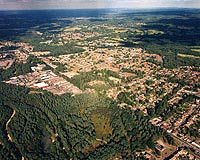 |
Washington (AFP) July 16, 2009 US retail giant Wal-Mart on Thursday announced plans to develop a database that it said would revolutionize shopping by putting information about products' sustainability at consumers' fingertips. The database, dubbed the sustainability index, could put information about how environmentally-friendly suppliers, manufacturers and their products are, just a garment label or barcode-scan away for shoppers, according to Wal-Mart executives speaking at a webcast gathering of their suppliers. The index would be put together in three phases, the first of which involves surveying Wal-Mart's 100,000-plus suppliers about how they operate, where a product is made and what goes into it. That stage got under way Thursday, when the 15-point survey was sent out to some US manufacturers. The questionnaire covers everything from a manufacturer's greenhouse gas emissions and location of factories, to water use and solid waste disposal. The next step in compiling the index will be to create a consortium of universities that would work with suppliers, retailers, NGOs and governments to develop the database. A technology company is being sought by Wal-Mart to create an open platform to power the index, Wal-Mart chief executive Mike Duke told the meeting at the retail giant's headquarters in Arkansas. Wal-Mart pledged to put up funds to get the index off the ground but Duke stressed that the database is not intended to benefit only the retail titan. "It is not our goal to create or own this index. We want to spur the development of a common database that will allow the consortium to collect and analyze the knowledge of the global supply chain," Duke said. The third and final phase would see the index up and running, and consumers accessing and benefiting from it. John Fleming, chief merchandising officer for Wal-Mart, outlined how the index might work, while stressing that the end product was several years down the line. Consumers might point their multi-application handheld devices at a product while shopping online or in-store to get information about the product. With a T-shirt, they might see the field where the cotton came from, probably with a picture of the farmer, Fleming said. "There would be information about how much cotton was used, how many 'product miles' were consumed to get that T-shirt into the store. "That will make a difference in terms of what products customers consider," especially with future generations of consumers who care deeply about the environment and sustainability, he said. Share This Article With Planet Earth
Related Links
 Britain greenlights first eco towns
Britain greenlights first eco townsLondon (AFP) July 16, 2009 Britain gave the green light Thursday to four so-called "eco towns," claiming it is playing a leading role globally in promoting carbon neutral communities. The green towns are designed as the first of 10 such projects Prime Minister Gordon Brown's government wants to set up by 2020, despite criticism and local opposition in some cases. "The revolutionary concept of eco towns is a unique ... read more |
|
| The content herein, unless otherwise known to be public domain, are Copyright 1995-2009 - SpaceDaily. AFP and UPI Wire Stories are copyright Agence France-Presse and United Press International. ESA Portal Reports are copyright European Space Agency. All NASA sourced material is public domain. Additional copyrights may apply in whole or part to other bona fide parties. Advertising does not imply endorsement,agreement or approval of any opinions, statements or information provided by SpaceDaily on any Web page published or hosted by SpaceDaily. Privacy Statement |